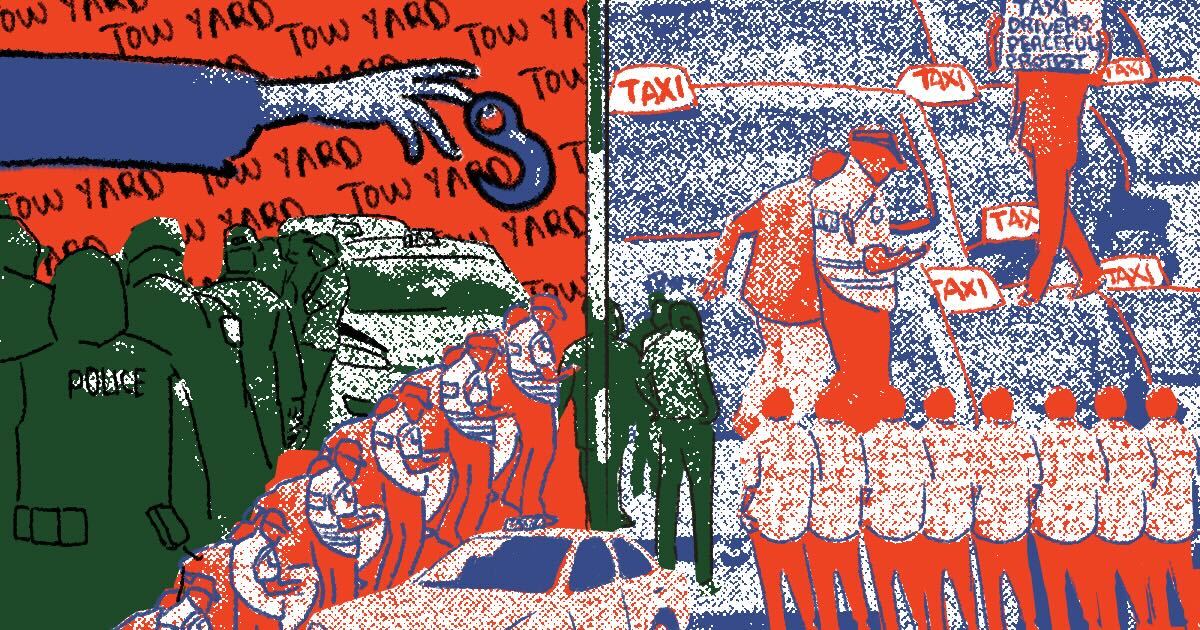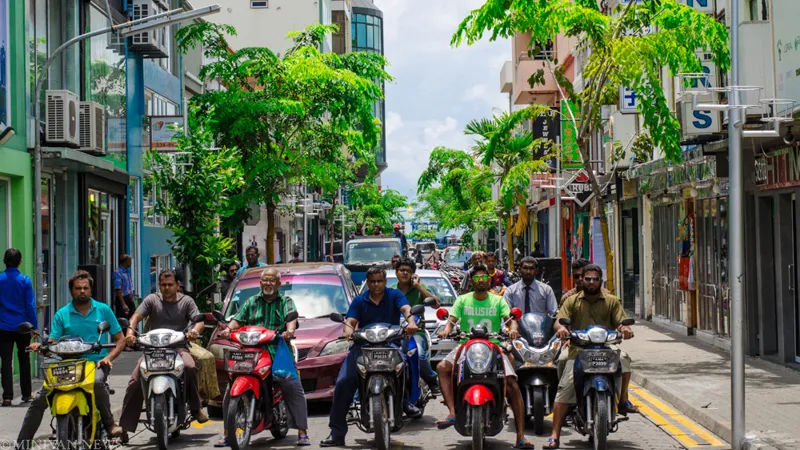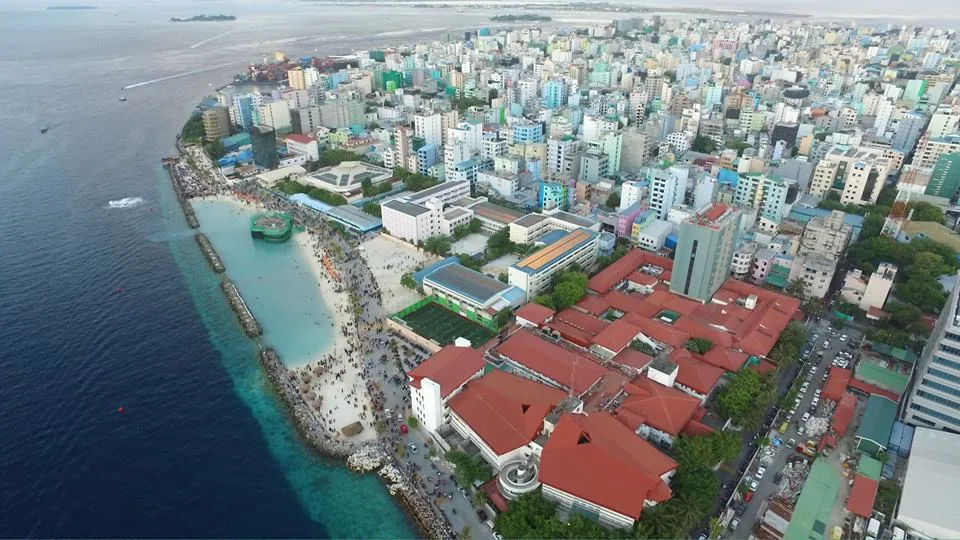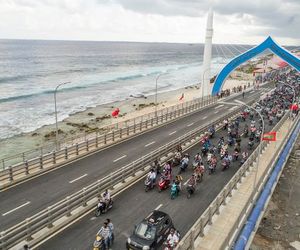Electric dreams and driver nightmares: state-run taxi plan sparks backlash
The industry fears 10,000 workers could be affected.

Artwork: Dosain
19 Feb 2025, 18:11
Plans to modernise Malé's taxi service with a state-run electric vehicle fleet have been met with fierce resistance from the capital's taxi drivers, who fear the decision could devastate the livelihoods of 10,000 workers.
Last Wednesday, the transport ministry enlisted the state-owned Maldives Transport and Contracting Company to launch the service in the Greater Malé Region this year.
“I believe that there will not be a difficulty that those in the taxi service today would face from creating such a taxi line,” Transport Minister Mohamed Ameen insisted at the MTCC contract signing ceremony. Similar efforts have been made in developed countries to “provide a taxi service to the public under a controlled system,” he claimed.
The move comes after years of public frustration with taxi services in the densely-packed capital with persistent concerns over reliability, overcharging and service quality. The MTCC taxi line could help ease congestion in the medium-term and incentivise raising the standards of private taxis, the government suggested.
But taxi drivers the Maldives Independent interviewed were worried and skeptical.
"We already have too many vehicles on the streets. There's a lot of cars and a lot of traffic. When the government brings in 300 more cars it will get even more jammed," said Ismail, a 40-year-old taxi driver, who cited space constraints and traffic congestion as the primary reason for service delays.
Aminath Zahira, one of the few female drivers in the city, emphasised the impact on Maldivian workers, and cast doubt on MTCC’s promise to guarantee quick service times.
“The government lied to us. They told us they wouldn’t do this and did it anyway. There are people who bought cars through the SME loan scheme and they are paying back those loans but still haven’t got their vehicle registered,” she said.
“This will affect a lot of people and their families.”
The battle over the future of taxi services is playing out in one of the world's most challenging urban environments. Home to nearly 150,000 people crammed into a two square kilometre island, Malé’s concrete grid of apartment blocks tower over a maze of narrow lanes choked with parked motorcycles.

Industry backlash
Avas Ride, the most widely-used online taxi booking platform, and the Drivers Association of Maldives decried the lack of consultation for a decision that could affect 10,000 people in the sector. The government has reneged on a commitment to consult and conduct studies before making a decision, they alleged.
"The government's decision to ignore concerns of taxi drivers and all stakeholders in the industry was done without any consideration for the rights of the people working in the industry or their families," Avas Ride said in a statement.
The transport ministry had indicated no such fleet was being planned in response to a recent right to information request, the company noted.
The main opposition Maldivian Democratic Party sided with taxi drivers.
“The government is trying to deceive by saying that MTCC’s taxi line will not cause losses to independent businesses…The government should not have the option of entering into any business whenever it sees fit,” MDP chairman Fayyaz Ismail tweeted.
The Drivers Association called on the public to stand up in solidarity with taxi drivers against the "unjust actions being taken against an industry that has made significant strides with much hard work.”
Unsympathetic public
But many Malé residents were unmoved by the plight of taxi drivers.
On social media, responses to the call to protest were overwhelmingly negative. One man recounted waiting 50 minutes for a taxi on Majeedhee Magu – the capital’s main thoroughfare – with his wife and one-year-old child while trying the Avas Ride mobile app.
“This isn’t the first time Avas Ride has canceled on us after making us wait, just because they found a better offer,” he posted on X.
The Maldives Independent spoke to several people who faced similar experiences.
Madhuha Abdul Rahman, 28, said she prefers either walking or taking Avas motorbikes or pickups because it was nearly impossible to hail a taxi in Malé.
“I usually walk since I live close to work or take Avas bikes if I have to get somewhere during the day. I prefer a pickup if I have luggage. I have faced drivers who demand more than the set rates and get more passengers in the same ride and still charge the full amount,” she said.
Others highlighted the refusal of taxi drivers to take rides if the destination is close to schools or other hotspots during peak hours.
“But if you come out to the outer [ring] road and try to take a taxi, then it’s easier,” said a resort worker who was visiting Malé on his day off.
The lack of professionalism of some Avas drivers was a particular concern for women.
“My friend blocks all the riders from the app. After they drop the passenger, they will try to text, because they have your details. Some of them are nice, and then some of them will try to talk to you on the way,” said Angel (name changed to protect privacy), a 36-year-old migrant worker.
Drivers in a taxi service operated by MTCC could be more inclined to follow rules and safety etiquettes, Madhuha suggested.
“But it wouldn’t make getting around Malé any easier. There are too many motorbikes and cars traveling and parked. I would walk more if the roads were more shaded and if it was easier to get on and off pavements [blocked by parked vehicles],” she said.
A few bad apples
Zahira, the female taxi driver, addressed complaints about drivers refusing rides within Malé in favour of more lucrative trips to Hulhumalé across the Sinamalé bridge.
“I don’t think everyone should be punished for the actions of a few drivers. I take a ride no matter where it is. It’s more beneficial for me to do three rides within Malé than to do a ride to Hulhulé [airport island] or Hulhumalé in the same amount of time, and wait in the traffic light,” she said.
Taxi driver Ismail acknowledged price gouging by some of his colleagues and encouraged the public to report offenders. “The drivers continue to do it because people let it go without reporting it. There is a government hotline to report violations,” he said.
But he defended drivers who refuse rides.
“If someone comes from Villingili and asks for a ride to Aminiya School, I would know which roads are closed and how long it would take to get there…Because I know I can't get anywhere near there easily,” he explained.
Some destinations such as AMDC clinic require long and circuitous routes. “There’s no other way. It’s also a narrow road and you have to scrape your way through. There are drivers who really worry about their car," Ismail said.

Protests and prosecutions
The government’s intervention followed months of unresolved disputes with taxi drivers over compliance with transport ministry guidelines.
In May last year, police officers were deployed to manage the Velana International Airport’s taxi queue over public complaints about taxi drivers overcharging or refusing rides. Amid the standoff, the transport ministry revised the fixed taxi fares with higher rates for seven- to 10-seater vehicles. All vehicles were allowed to charge extra for trips to the domestic terminal or for more than three items of luggage.
But in December, taxi drivers staged a series of protests in Hulhumalé after Transport Minister Ameen informed a parliamentary committee about the plans for a government-operated taxi service.
On December 11, a group of taxi drivers ended one of their protests by blocking off the main road linking the airport to Hulhumalé, prompting a police crackdown. Three people were arrested and 21 vehicles were impounded.
Two protesters were remanded for five days in custody. Misbah Shareef, secretary general of the Drivers Association and one of the leaders of the protest, was arrested two days after the blockade.
Earlier this week, the Prosecutor General’s Office pressed charges of obstructing government duties against the three drivers. The three men are accused of refusing to obey police orders to leave the area. Their actions amounted to obstruction of the duty of police officers to ensure public safety and enforce traffic rules, the PG office said.
The future is electric
According to MTCC, the taxi service will start with a fleet of 100 electric vehicles operating in Malé, Hulhumalé, and the airport, expanding to Villimalé, Gulhifalhu, Thilafushi, Giraavaru, Rasmalé, Addu, Fuvahmulah, and Kulhudhuffushi in future phases.
Taxis can be ordered through a mobile application similar to existing ride-hailing platforms, which would offer features such as booking, tracking, and digital payments.
Vehicles will be available in different sizes, accommodating three to seven passengers for standard rides and five to 10 passengers for business customers with premium interiors. The service will include 24-hour operations, cashless transactions, and a seven-day pre-booking option for premium subscribers, MTCC said in a media kit.
Measures to ensure passenger safety include speed monitoring as well as CCTV and dashboard cameras. The government company pledged adherence to fixed fares and assured that drivers would not have the option to decline trips. The service will be staffed by both full-time (40 percent) and part-time (60 percent) drivers. The part-time positions will require a minimum of four hours a day capped at 28 hours per week.
The company expressed confidence in sustainably operating the taxi line without government subsidies.
Ismail, who works part-time, worried about the impact on drivers such as himself who own their vehicles. “If I give this to someone else, they won’t drive it either. They would also go [to MTCC]. Car owners will face a big loss,” he said.
Reflecting growing public cynicism over an entrenched culture of corruption, Ismail expected inflated maintenance contracts to be awarded to businesses with ties to government officials.
“I will try to do maintenance work for my vehicle with the lowest rate but they will find the highest,” he said.
Zahira predicted that the MTCC jobs would become a new tool for political patronage. “Each MP will get to give out these slots in the taxi fleets, and it will be distributed how they want. It will just lead to people becoming slaves,” she warned.
But Aishath Sana (name changed to protect privacy), a 30-year-old resident of Malé, was more hopeful about the state-run service.
“I have family members who have driven taxis and been Avas drivers. It’s a big challenge for drivers to maintain it. The biggest difficulty for taxi owners is having to pay garage fees every month,” she said.
“So if the government is providing solutions to all of that through something like this and then give job opportunities, it sounds like a pretty good deal actually.”

Discussion
No comments yet. Be the first to share your thoughts!
No comments yet. Be the first to join the conversation!
Join the Conversation
Sign in to share your thoughts under an alias and take part in the discussion. Independent journalism thrives on open, respectful debate — your voice matters.



